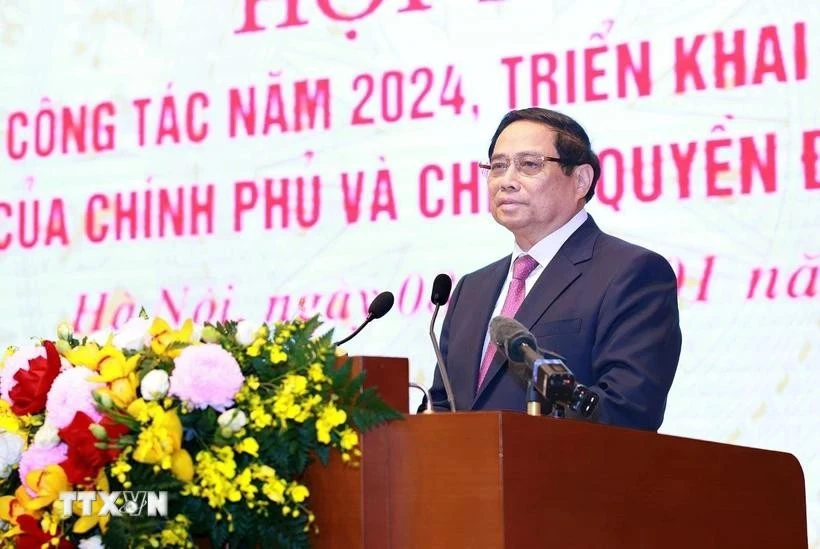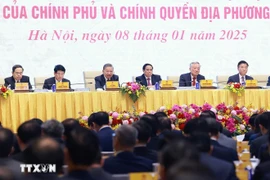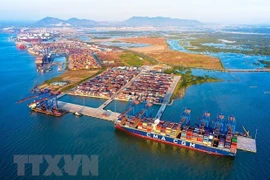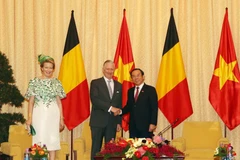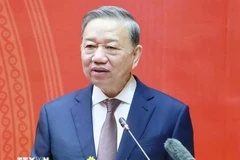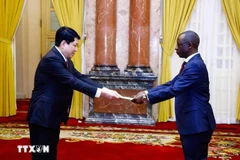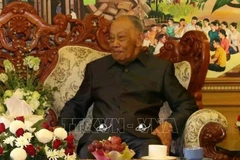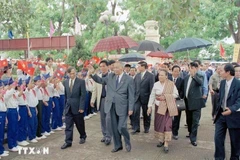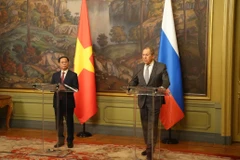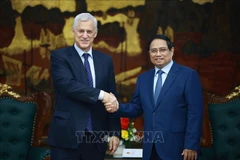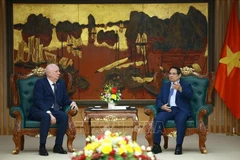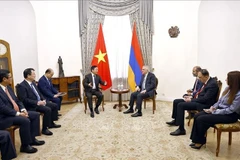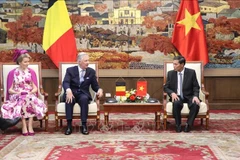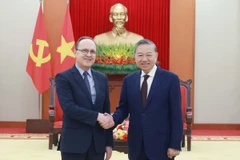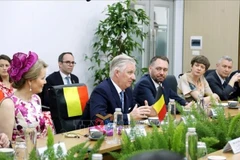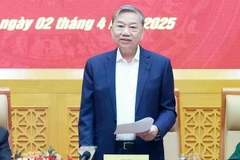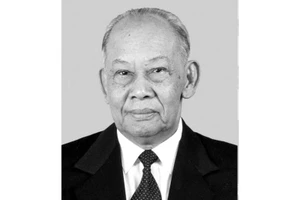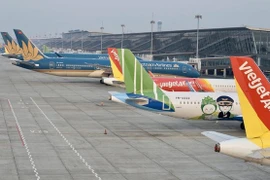Hanoi (VNA) – The Government and its members, and leaders of ministries and localities commit to successfully completing all tasks set for 2025, an important year with many significant events of the nation, Prime Minister Pham Minh Chinh affirmed at a conference held in Hanoi on January 8 to review the Government and local administrations’ performance in 2024 and launch tasks for 2025.
As reported at the conference, the country's GDP growth surpassed 7%, and the economy's size reached around 470 billion USD in 2024. The inflation rate was controlled below 4%, and major balances of the economy were maintained. Total import-export turnover set a record, at around 800 billion USD, posting a trade surplus of about 24 billion USD. State budget revenue hit 2 quatrillion VND (over 78.8 billion USD.)
Vietnam remains a safe and attractive destination for international businesses, partners, and investors. It ranks among the top 15 global developing countries in terms of attracting foreign investment, with inflows reaching about 40 billion USD, with a disbursement value of about 25 billion USD. It is also one of the top 20 economies in the world in terms of international trade size, with 17 free trade agreements, making it a key link in regional and global supply chains.
PM Chinh attributed these results to the joint efforts of the whole country, especially the Government and local administrations’ strict implementation of directions from the Party Central Committee, the Politburo and Secretariat, as well as the Party General Secretary.
The Government and local administrations have demonstrated unity and strong determination, with great efforts and decisive actions focused on key areas, close and effective coordination with the National Assembly, political institutions, and the support of the people, businesses, and international friends.
Outlining major lessons learnt from last year, PM Chinh stressed the significance of flexible, timely, proper and effective policy responses to emerging, sensitive, and complicated issues, the consensus of authorities and people at all levels, the priority of national interest, the spirit of self-reliance, confidence, independence, and national pride, as well as the absorption of ideas and feedback from people, scientists and experts.
He also pointed to the need for fast decision-making, a long vision, renovation in mindset and resources from people and businesses, as well as efforts to overcome difficulties and challenges, with clear allocation of tasks to particular people, clear responsibility, deadlines and results.
The PM underlined that 2025 marks the final year of the five-year socio-economic development plan (2021-2025), a year expected to face more challenges and difficulties than opportunities and advantages.
In this context, it is crucial to review the targets and tasks set for the entire five-year period for further improvements, he said, stressing that efforts should be made to complete the remaining targets and strive to reach the highest possible outcomes for the 2021-2025 plan.
Focus should also be placed on stepping up the streamlining of the political system’s organisational structure to ensure smooth, effective operations, while successfully organising major national events, including the 95th founding anniversary of the Communist Party of Vietnam, the 50th anniversary of the Liberation of the South and National Reunification, the 135th birth anniversary of President Ho Chi Minh, and the 80th founding anniversary of the nation. Meanwhile, it is necessary to successfully organise all-level Party congresses, leading up to the 14th National Party Congress, he added.
The Government will prioritise promoting economic growth in tandem with stabilising the macroeconomy, controlling inflation, and ensuring major balances of the economy, PM Chinh said, stating ministries, sectors, and localities must strive for an economic growth target of at least 8% for 2025.
According to the Government leader, a focus should be given to renewing traditional growth drivers, namely investment, consumption and exports, while creating breakthroughs for emerging sectors such as digital transformation, green transition, semiconductors, big data, AI, IoTs, cloud computing and clean energy, among others. Besides, he stressed that breakthrough policies must be built to mobilise social resources, capitalise on business resources, and develop the private sector.
He ordered ministries, sectors, and localities to push ahead the rearrangement of the organisational apparatus, ensuring ideological alignment and consensus across the political system. Besides, it is a must to effectively carry out the Government’s action programme to concretise the Politburo’s Resolution No.57-NQ-TW on science-technology, innovation, and digital transformation as well as accelerate the implementation of three strategic breakthroughs, particularly institutions.
Due attention will be given to advancing strategic infrastructure, including space, maritime and underground capabilities, and developing high-quality human resources, notably through a programme to train 50,000 – 100,000 semiconductor engineers, he underscored.
The Prime Minister emphasised social welfare initiatives for 2025, including the elimination of temporary and dilapidated housing and the construction of 100,000 social housing units, adding a focus will be channelled to ensuring political stability, advancing international integration, promoting the Party building work, and preventing corruption, wastefulness and negative phenomena.
In conclusion, he affirmed the Government’s commitment to solidarity and responsibility, striving to achieve the plan set out for 2025, establishing a solid foundation for the country to propel into a new era – that of the nation’s rise./.
